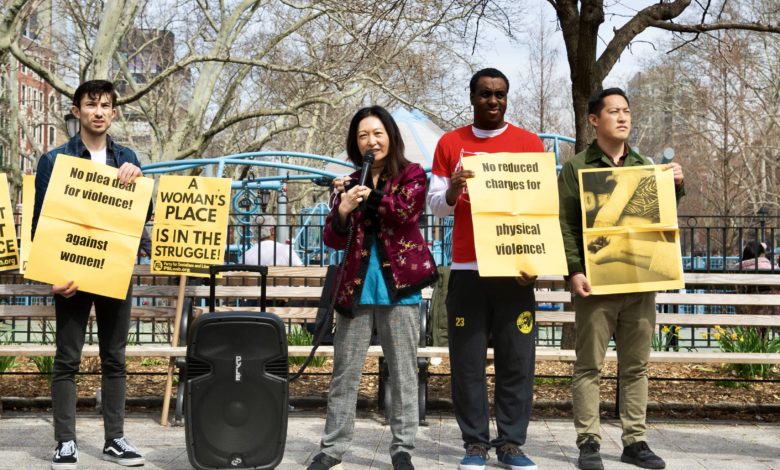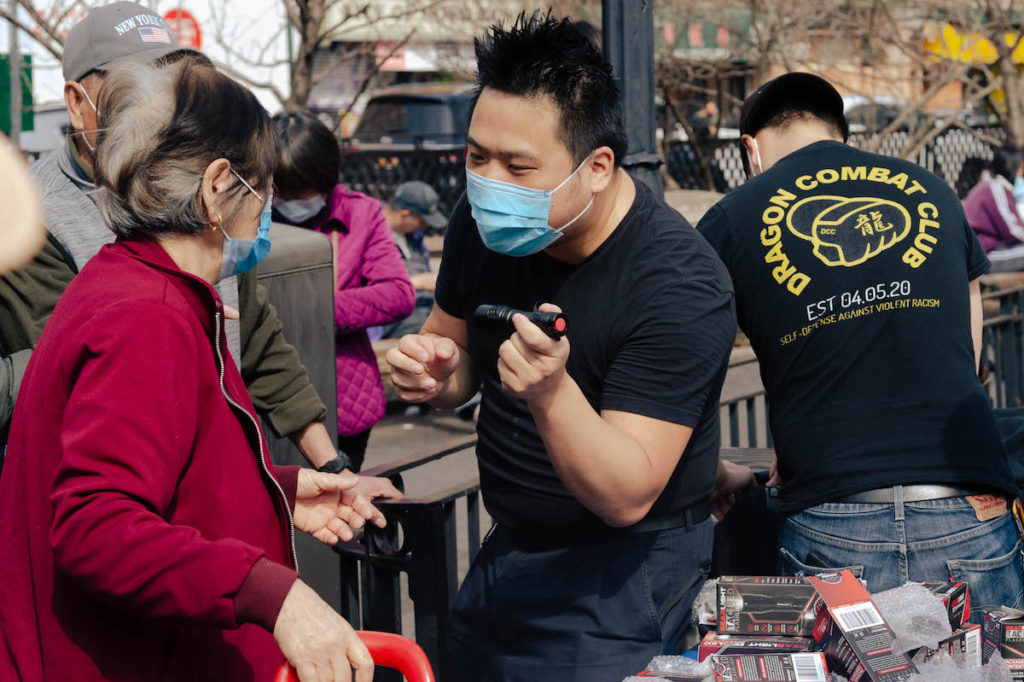
On March 19, around forty people gathered in New York City’s Chinatown to demand an end to racist, sexist violence against all women. The speak out commemorated the one-year anniversary of the Atlanta spa shootings, in which Robert Aaron Long went on a shooting rampage and killed eight people, six of whom were Asian women. The action also occurred in the wake of the brutal murder of 35-year-old Korean American Christina Yuna Lee a few weeks before, just blocks away from where the crowd gathered.
The Party for Socialism and Liberation and ANSWER Coalition coordinated the action, and it was attended by organizations such as Nodutdol for Korean Community Development and Youth Against Sweatshops. Dragon Combat Club distributed personal safety devices, such as pepper spray, personal safety alarms and tactical flashlights, to women and the elderly.
Some women at the rally described their own painful experiences of anti-Asian assault and the uphill battle of seeking justice. Judi (last name withheld), who is Chinese American and an organizer with the PSL, recounted how a man assaulted her after an argument at a COVID testing site, putting her into the emergency room with a fractured wrist bone.
“He put on his black leather gloves [in preparation to assault me] as he watched me leave the COVID testing site — this was all caught on video footage,” Judi told the crowd. “He followed me out, confronted me … He put two hands on my chest and shoved me onto the cement sidewalk, like a rag doll. I broke my fall with my wrist, and it was badly fractured. Surgeons took two hours to implant a metal plate in my wrist.”
According to Judi, her assailant had lied to the police and made false allegations of harassment against her, which led to her arrest by officers as she lay in her hospital bed. The police report later identified him as an off-duty auxiliary NYPD officer.
“Fast forward 15 months later, I learned the prosecutor doesn’t want to prosecute my assailant!” Judi exclaimed. “They want to give him a complete dismissal!”
Capitalism and imperialism root causes of anti-Asian violence against women
Along with highlighting the role of racism and sexism in these kinds of attacks, speakers indicted capitalism as the root cause of anti-Asian violence.
“The mainstream media calls these killings individual crimes of hate, but we know that this violence is systemic,” noted Jia Hong, an organizer with Nodutdol. “America commits violence against immigrant women, against Asian women everyday … We face violence in abusive relationships, we face violence when we cannot afford healthcare, we face violence in racist and exploitative workplaces. Anti-Asian violence is systemic and felt everyday under capitalism.”
Workplace violence
Other organizers spoke in-depth of the unique violence and exploitation at the workplace, tying the recent attacks to a much larger deep-rooted history of the devaluation of the labor and lives of Asian women workers.
Reading a statement prepared by members of Youth Against Sweatshops, Mahir Rahman condemned local nonprofit Chinese-American Planning Council’s practice of forcing home attendants, the majority of whom are Asian and Latina women, to work 24-hour shifts — often for weeks and months at a time.
“Everyone in America is bombarded with the same message that Asian women are submissive and hardworking,” read Rahman. “Our food is cheap, our labor is cheap, our lives are cheap. Entire industries rely on society’s acceptance of worthlessness so that they can continue to force Asian women into sweatshop conditions, steal our wages, and work us to death. This is the foundation of the lucrative homecare industry with its 24-hour shifts, and this is what makes Asian women prime targets for street violence.”
Organizers also drew the link between the rapidly escalating anti-China propaganda assault and history of U.S. military dominance abroad to violence domestically.
“This propaganda war against China is fueling these attacks on Asian people,” said Amanda Yee, an organizer with the PSL. “This kind of anti-China new Cold War media coverage contributes to an already existing atmosphere where Chinese and Asian people have historically been dehumanized in Americans’ minds, making them more vulnerable to violent attacks.”
According to speakers, since the roots of racist and sexist violence are systemic, the solutions and responses to recent attacks must be as well.
“The Pacific is the most militarized region on Earth, with over 600,000 U.S. soldiers stationed from Korea to Australia to Alaska,” Hong reminded the crowd. “U.S. imperialism uses its soldiers to occupy and violently squeeze cheap labor and resources from our countries.”
She continued, “We have no choice but to be anti-imperialist and feminist, because the U.S. military is the greatest purveyor of gender violence in the world.”






